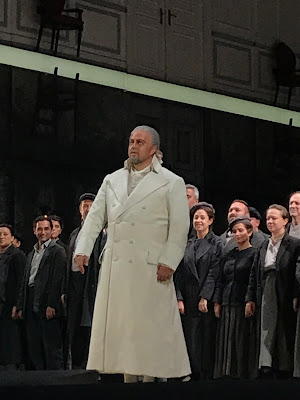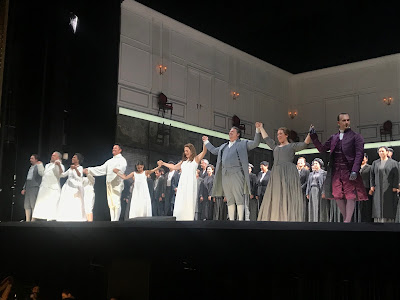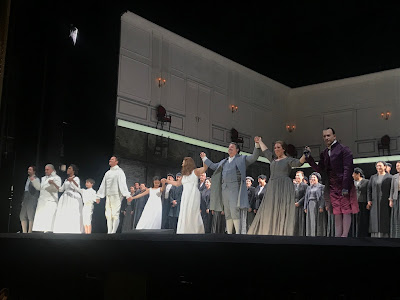Seis anos depois voltei a ver a encenação de R Carsen da opera A Valquíria
de Wagner, desta vez no Teatro real de Madrid.
A produção não tem qualquer interesse, a acção foi trazida para a segunda
guerra mundial. Tudo se passa em diferentes cenários frios e austeros do
campo de batalha, com excepção do início do 2º acto, num imponente salão de
inspiração nazi. A ópera é desprovida de qualquer misticismo, quase todas as
personagens são figuras militares (apenas Fricka e Brünhilde são civis). As incoerências cénicas são muitas. A
espada Nothung está num tronco totalmente a despropósito no contexto (um
acampamento militar), dado todos usarem metrelhadoras e outras armas de fogo. O
início do 3º acto é muito mau. As valquírias, vestidas de senhoras e ensaiando
brincadeiras de criança, beijam os heróis estropiados e mortos e estes a
levantam-se, tipo zombies, e sobem umas escadas ao fundo do palco. Mas o pior é
o fogo sagrado, dividido entre uma pequena vela pífia colocada a meio do palco
e uma pequeníssima linha de chamas ao fundo, de intensidade tipo “campingás”.
A Orquestra
do Teatro Real esteve muito bem,
superiormente dirigida pelo maestro Pablo Heras-Casado.
Stuart Skelton cantou um Siegmund muito decente,
por vezes em esforço, mas não desafinou e ouviu-se sempre sobre a orquestra. O
cantor tem uma figura péssima para a personagem viril que interpreta.
A
Sieglinde
da Adrianne Pieczonka foi convincente em
palco. A interpretação vocal foi decente, embora a cantora, no registo mais
agudo, tenha resvalado frequentemente para a estridência.
René Pape foi magnífico como Hunding, vocalmente irrepreensível e com excelente
desempenho cénico. Foli pena ter cantado um papel tão pequeno.
A grande
interpretação da noite foi a de Tomasz Konieczny como Wotan. Tem uma voz magnífica, poderosíssima, de timbre muito bonito e o
cantor ofereceu-nos uma interpretação muito emotiva, como raramente se vê.
Fantástico.
A
Brünnhilde da Ricarda Merbeth começou mal mas foi melhorando e, no 3º acto, teve partes muito boas. Ainda
assim, deixou-se afogar ocasionalmente pela orquestra e interpretou a
personagem de forma mais gritada que cantada.
Das senhoras
a melhor foi, de longe, Daniela
Sindram como Fricka. Tem uma voz poderosa, sempre afinada e foi muito
expressiva. Não conhecia a cantora mas é um nome a reter.
E o pior foram as Valquírias. A
encenação já é muito má, mas a interpretação também não teve a menor qualidade,
em contraste com os cantores solistas.
Mas é sempre um privilégio assistir a
esta ópera, sobretudo quando a interpretação musical é de qualidade, como foi o
caso.
****
LA
VALQUIRIA / DIE WALKÜRE - Teatro Real, Madrid, February 2020
Six years
later I saw again R Carsen's production of Wagner's opera Die Walküre, this
time at the Teatro Real in Madrid.
The
production has no interest, the action was brought to the second world war.
Everything happens in different cold and austere scenarios of the battlefield,
with the exception of the beginning of the 2nd act, in an imposing
Nazi-inspired hall. The opera is devoid of any mysticism, almost all the
characters are military figures (only Fricka and Brünhilde are civilians). The
scenic inconsistencies are many. The Nothung sword is on a log completely
unnecessary in the context (a military camp), since everyone uses machine guns
and other firearms. The start of the 3rd act is very bad. The Valkyries,
dressed as ladies and rehearsing children's games, kiss the crippled and dead
heroes and they get up, like zombies, and go up some stairs at the end of the
stage. But the worst thing is the sacred fire, divided between a small fife
candle placed in the middle of the stage and a very small line of flames in the
background, with an intensity like “campingas”.
The Teatro Real Orchestra was very well, superiorly directed by maestro
Pablo Heras-Casado.
Stuart Skelton sang a very decent Siegmund, sometimes in
effort, but he didn't tune out and was always heard about the orchestra. The
singer has a terrible figure for the manly character he plays.
Adrianne Pieczonka's Sieglinde was
convincing on stage. The vocal interpretation was decent, although the singer,
in the highest register, often slipped into stridency.
René Pape was magnificent as Hunding, vocally flawless
and with excellent scenic performance. It was a pity thet he sung such a small
role.
The great
performance of the night was that of Tomasz
Konieczny as Wotan. He has a magnificent voice, very powerful, with a very
beautiful timbre and the singer offered us a very emotional interpretation, as
is rarely seen. Fantastic.
Brünnhilde
from Ricarda Merbeth started badly
but got better and, in the 3rd act, had very good parts. Even so, she was
occasionally drowned by the orchestra and interpreted the character more
shouted than sung.
The best of
the ladies was, by far, Daniela Sindram
as Fricka. She has a powerful voice, always in tune and was very expressive. I
didn't know the singer but it is a name to keep.
And the
worst were the Valkyries. The staging is already very bad, but the performance
did not have the least quality either, in contrast to the soloist singers.
But it is
always a privilege to watch this opera, especially when the musical
interpretation is of high quality, as was the case.
****


























































